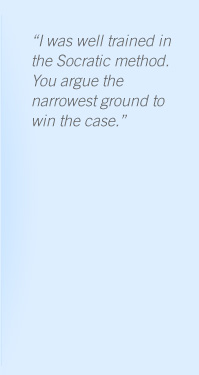|
In late June of 2000, I made the long drive up to Penobscot Bay in Maine in order to interview Archibald Cox for the Columbia University Oral History
Research Office. Though best known for his role in the Watergate scandal of the Nixon era, Cox's shadow was far broader. He had distinguished himself as
a liberal stalwart, leading Common Cause through the 1970s and 1980s. His tenure as solicitor general under John and Robert Kennedy was legendary.
For me as a recently minted lawyer and a doctoral student in twentieth-century U.S. history, Archibald Cox was a looming figure: special prosecutor,
solicitor general, and Harvard law professor. Each role Cox had played could inspire awe and fear. Thus, it was with some nervousness that I first
knocked on the door at Cox's quiet home on that June day. The man who answered the door was kind and gentle, gladly welcoming me in. As it turned out,
Cox's wife was away for a few days, having gone to Boston on family business. Thus, the former solicitor general was a "bachelor" as he put it. I had him
to myself.
It being late June, as lawyers know, the Supreme Court was concluding its term and closing down for the summer. It is then that the Court, for a
variety of reasons, tends to hand down its most significant cases of the year. Unsurprisingly, Cox was eager to discuss the decisions with me. Prior to
arriving at his house the first morning, I devoured the morning papers and listened closely to Nina Totenberg's analysis on NPR, determined to provide
one of the nation's experts on constitutional law with a worthy discussion partner. As I hoped and feared, we spent a good part of the morning discussing
the Court's ruling that pre-game prayers at high school sporting events violated church-state separation requirements. He was learned, but like a good
teacher, also eager to help me think through the decisions. Then we turned on the tape recorder.
Cox was eager to talk about his time as solicitor general. He recalled many cases in detail, some less so. But I remember him being reflective and
analytical about the law and his role in shaping it. In just a few days we went through pages of questions that I thought would require a week of
interviewing, but he usually had a lot to say. Cox figured that since his wife was away he might as well use the time to talk with me uninterrupted rather
than spending only a few hours each day. As a result, in the middle of a long day of interviewing, we took a lunch break and drove out to one or another
utterly unpretentious seafood shacks on a hill overlooking the rocky Maine shores. These were places where you ordered through a pull-up screen and then
took your order to a picnic table. Every day Cox ordered the same thing: a fried scallop roll. On the way home from lunch the final day I remember
thinking, "Wow, Archibald Cox is riding shotgun in my car!" About that time, Cox said in a wry, New England way, with his Massachusetts accent
in full flower and a barely detectable grin, "You might have noticed that I like scallops."
For some reason, it is that line (not found on the tapes of the oral history presented here) more than any other that stuck with me. Perhaps it is
because I love to eat (and share his love for scallops). But more than that, it was the moment where I realized that while Archibald Cox was a legal
legend, a man who helped end the greatest constitutional crisis in American government, and a man who devoted his life to the fight for the cause legal
liberalism, he was also a man of humor and kindness, who enjoyed life's simple pleasures. When I read in May of 2004 that he had died I thought
immediately of our lunches at the picnic bench discussing the Supreme Court.
— Thomas Hilbink
© 2006 Columbia University Libraries
Oral History Research Office | Rights and Permissions | Help
Developed by Columbia University Digital Knowledge Ventures
|
 |
 |
 |

